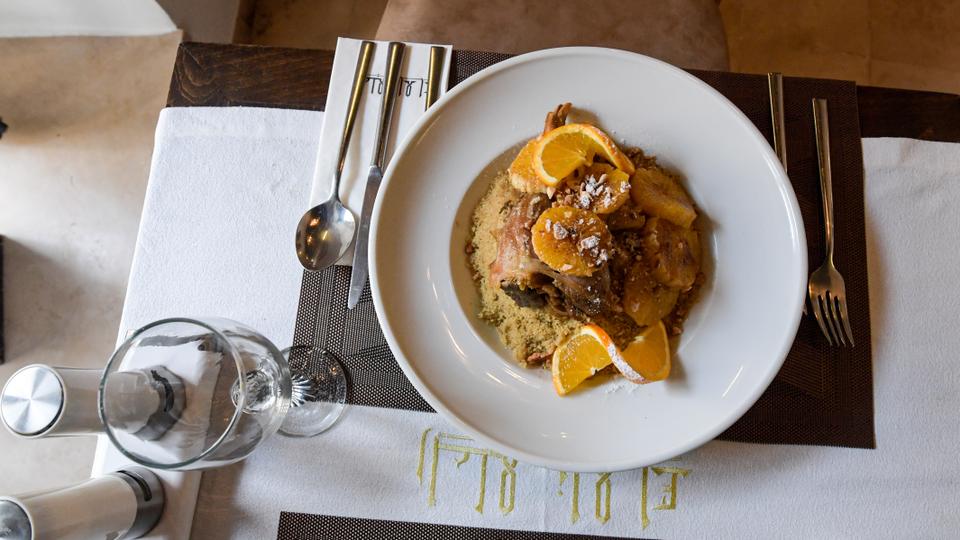Couscous receives UNESCO heritage status
Couscous is prepared from wheat or barley, and sometimes from maize, millet or sorghum, which is ground into semolina; it is served with meat or fish, spicy stews, chickpeas and vegetables in a mouth-watering variety of dishes
.

This picture taken on December 16, 2020, shows a dish of lamb and orange couscous at a restaurant in the Medina (old town) of Tunisia's capital Tunis. (AFP)
Couscous, the Berber dish beloved across northern Africa's Maghreb region and beyond, has joined the UN list of the world's intangible cultural heritage.
The countries that submitted the listing to UNESCO – Algeria, Morocco, Tunisia and Mauritania – may have their differences, but their common love of the grain staple runs deep.
"Couscous, present at every social or cultural event, is at once ordinary and special," their joint presentation argued.
"Ordinary because of the frequency of its use in a family setting, and special because of the unifying and propitiatory role it plays at convivial community occasions at which food is shared."
Bland by itself, couscous is served with meat or fish, spicey stews, chickpeas and vegetables in a mouth-watering variety of dishes.
Moroccan restaurant owner Hicham Hazzoum was among the couscous connoisseurs who applauded UNESCO's honour.
"I think we are the only Arab countries to have a high regard for this dish," he said. "It is impossible not to eat it every Friday.
"Moroccans are crazy about couscous and even children love it. It shows that the couscous flame will never go out."
Across the region, couscous – also known as Seksu, Kusksi and Kseksu – is as elementary as rice or noodles are to Asian cuisine, the staple without which no meal is complete.
Arabic dictionaries have documented "Kuskusi" since the 19th century, though it is known to be far older.
The regional pride in couscous found full expression in the countries' joint nomination for the "knowledge, know-how and practices pertaining to the production and consumption of couscous".
"Women and men, young and old, sedentary and nomadic, from rural or urban communities or from immigrant backgrounds all identify with this element," it gushed.
"The ethos of couscous is the expression of community life."
Couscous, the Berber dish beloved across northern Africa's Maghreb region and beyond, has joined the UN list of the world's intangible cultural heritage.
The countries that submitted the listing to UNESCO – Algeria, Morocco, Tunisia and Mauritania – may have their differences, but their common love of the grain staple runs deep.
"Couscous, present at every social or cultural event, is at once ordinary and special," their joint presentation argued.
"Ordinary because of the frequency of its use in a family setting, and special because of the unifying and propitiatory role it plays at convivial community occasions at which food is shared."
Bland by itself, couscous is served with meat or fish, spicey stews, chickpeas and vegetables in a mouth-watering variety of dishes.
Moroccan restaurant owner Hicham Hazzoum was among the couscous connoisseurs who applauded UNESCO's honour.
"I think we are the only Arab countries to have a high regard for this dish," he said. "It is impossible not to eat it every Friday.
"Moroccans are crazy about couscous and even children love it. It shows that the couscous flame will never go out."
Across the region, couscous – also known as Seksu, Kusksi and Kseksu – is as elementary as rice or noodles are to Asian cuisine, the staple without which no meal is complete.
Arabic dictionaries have documented "Kuskusi" since the 19th century, though it is known to be far older.
The regional pride in couscous found full expression in the countries' joint nomination for the "knowledge, know-how and practices pertaining to the production and consumption of couscous".
"Women and men, young and old, sedentary and nomadic, from rural or urban communities or from immigrant backgrounds all identify with this element," it gushed.
"The ethos of couscous is the expression of community life."
No comments:
Post a Comment